8 Types of Businesses that Can Benefit from Local SEO
- August 23, 2023
Struggling to reach your local customers? Unsure why your store or business has few people visiting or calling your phone number? Now is the time to consider applying local SEO.
As more people use the web, local SEO is becoming an increasingly sought-after commodity to boost online businesses. After all, a staggering 46% of all online searches have some form of local intent.
With the volatility of Google’s algorithm and with the nation’s population increasing in most towns and cities, it is crucial to have the expertise at handling the digital aspects of business locally, such as managing your Google Business Profile listing, your directory listings and your target keywords within your website’s content.
There is no doubt that local SEO can help any industry, but some businesses benefit more from this digital marketing method than others.
That is why it is important to be aware if you are a business that fits these criteria, as you could be missing out on an essential channel for your website.
Local SEO Statistics 2023 (Editor’s choice)
- 97% of individuals acquire information about a local business via the internet (Source: SEO Tribunal)
- More than a quarter (over 25%) of individuals choose to click on the initial result in a Google search (Source: Search Engine Journal)
- 86% of online consumers use Google Maps to source local businesses (Source: Safari Digital)
- 78% of location-focused mobile searches resulted in an offline purchase (Source: SEO Tribunal)
- Roughly 45% of global shoppers purchase a product online and then pick it up in-store (Source: Think With Google)
Why is Local SEO important for a website?
When assembling a digital marketing strategy, you should strongly consider local SEO since it can make your website more visible in local search results. Any business that has a physical location can benefit from this.
As more businesses are starting to utilise local SEO, and with how fast Google updates its search algorithm, you need to be ahead of the competition when using this channel.
Not only can a successful local SEO campaign build trust and credibility with your local traffic, but it can also teach you more about your geographical area and its market.
Local SEO provides opportunities to connect more with people in your neighbourhood and build a local reputation.
Other benefits of local SEO include:
- Higher in-store foot traffic – Enhanced local presence attracts increased in-person visits to your physical store.
- More phone calls – Thanks to Google Business Profile (formerly Google My Business), optimising local SEO for your business can lead to improved Google Maps visibility, and result in more phone calls and in-person visit
- More sales and conversions – Before enquiring or making a purchase, online consumers usually look at reviews to help with their decision-making process for a local business
1) Law firms
SEO provides significant benefits for law firms due to the specific nature of their practice.
Since individuals seeking legal assistance want to address their legal issues, implementing SEO strategies can help law firms attract relevant and organic traffic to their websites.
Previously, people would refer to Yellow Pages books to find local lawyers for their legal matters. However, today, the primary destination for seeking legal services is Google.
For instance, if someone suffers an injury, their first course of action would be to search for a personal injury lawyer on Google for more information on the necessary steps to help their situation.
These searches may consist of a keyword such as ‘personal injury lawyer London’ to find out more information on the law firms in their local area.
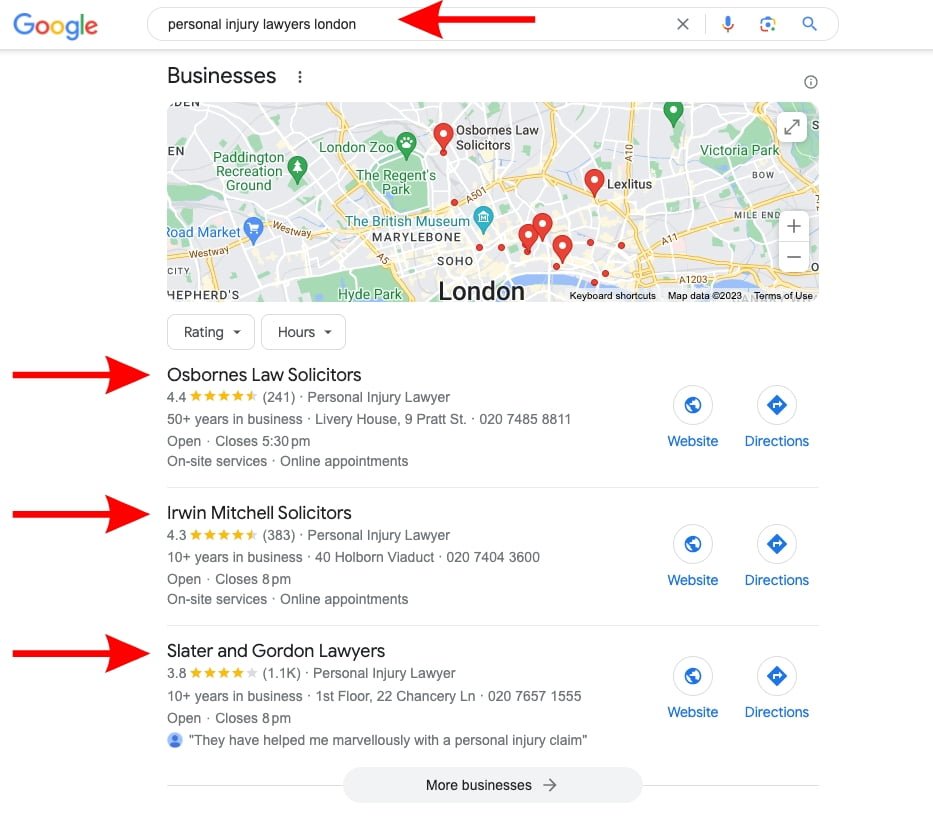
By integrating SEO strategies, especially focusing on local SEO, law firms have the opportunity to secure top rankings on Google in response to specific queries, thus increasing traffic and conversions for their business.
Also, if users search for lawyers in their local area, they can find results on Google Maps to meet their query. It helps them to instantly find contact information and the location of the business, so they can make their enquiry far quicker than they could in the past (especially when using a mobile device as they can tap the phone number and call the business instantly).
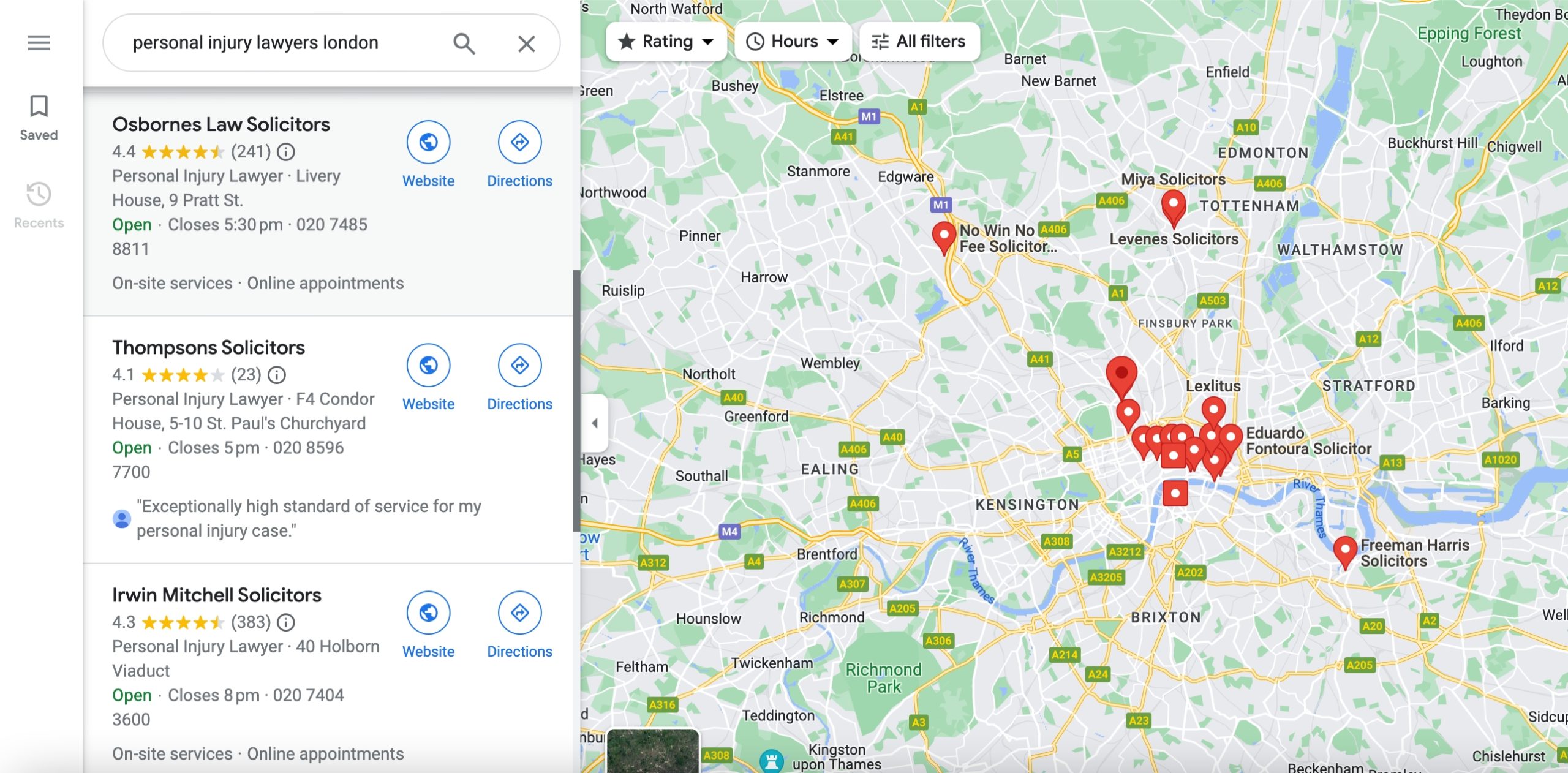
You might be thinking ‘How can I rank my website at the top for these long-tail keywords?’
Ultimately, ensure you optimise your website’s content for both long-tail keywords and the locations you are targeting.
For example, if you have a landing page called ‘Personal Injury Lawyers’, consider changing the name of it to ‘Personal Injury Lawyers in Manchester’. You should also change your URL, metadata and page content to reflect this. If your business operates in multiple locations, create multiple location landing pages with the same goal of ranking for the local long-tail keywords.
It’s plain and simple – the local searches for law firms mean it’s essential for them to harness the power of SEO for their website to increase their revenue. Since so many users search for lawyers in their area, it would be crazy for these businesses to not make the most of this!
2) Property
Another industry that can benefit from local SEO is the property sector (both residential and commercial).
This is because many users on Google are searching for homes and offices to rent or buy in their local area.
For example, if a business owner wishes to move to a new office space in Manchester city centre, they will likely search for ‘office space central Manchester’. Searching this will provide thousands of office options to choose from in search results, provided by commercial property agents.
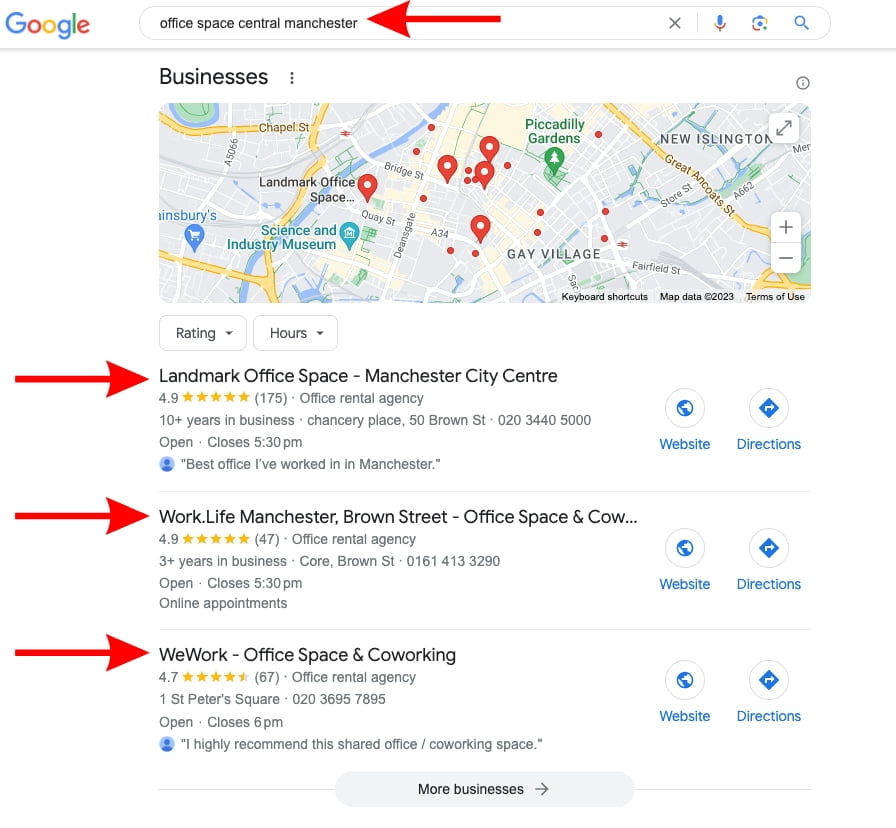
As with law firms, this same target market will also use Google Maps to see what commercial property agents are available in the local area.
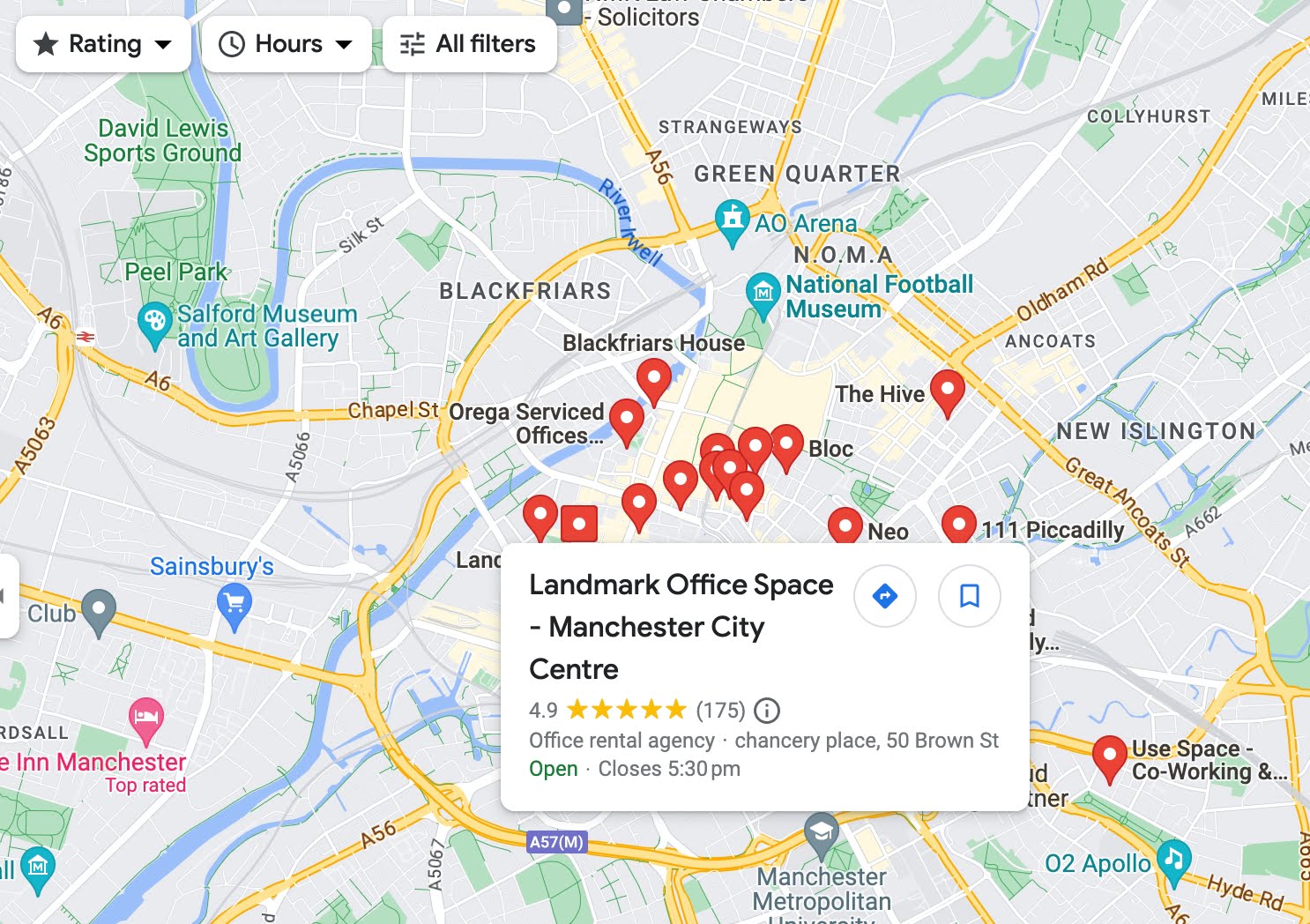
Of all the industries in this list, there is an argument that property agencies can benefit from local SEO the most. The high volume of users searching for local homes, office spaces and other types of property in geographical areas means it is essential for these websites to cater to the locations in their content and overall SEO strategy to set themselves apart from their online competition.
Ensure you are targeting each location with the most searched-for property keywords on your website for your geographical locations, and also consider the competitiveness of these keywords. Less competition on a keyword means it will be easier to rank for it.
Tools such as SEMRush and Ahrefs are great for conducting long-tail and local keyword research. Find your keywords, and begin to tailor your content around them.
3) Pet stores & services
If you have a fluffy companion at home that needs food, medical care or grooming, you will likely search for relevant pet services in your local area on Google. That is why pet stores and services must capitalise on local SEO to ensure they attract the online market in their geographical area.
If you own a pet store, an ideal place to start with local SEO is Google Business Profile. It is a fast-track way to get your business’s location to appear in Google Maps.
From here, you can increase your local visibility which can increase footfall, phone calls and enquiries from people in the vicinity of your business.
Another tip for pet websites is to optimise your content for relevant long-tail keywords such as ‘best dog leads for anxious puppies’. This can increase traffic to your landing pages as more users now use voice search on mobile devices to find what they are looking for.
4) Bars & restaurants
Once again, local SEO is at the forefront of another industry. Across the country, bars, pubs and restaurants greatly benefit from local targeting online.
Local SEO is critical for this industry because of the heavy usage of Google Maps by potential customers to find a suitable location for the food or drink they want. For example, a user may search for:
- Sushi restaurant near me
- Indian restaurant Manchester city centre
- Pizza place near me that delivers
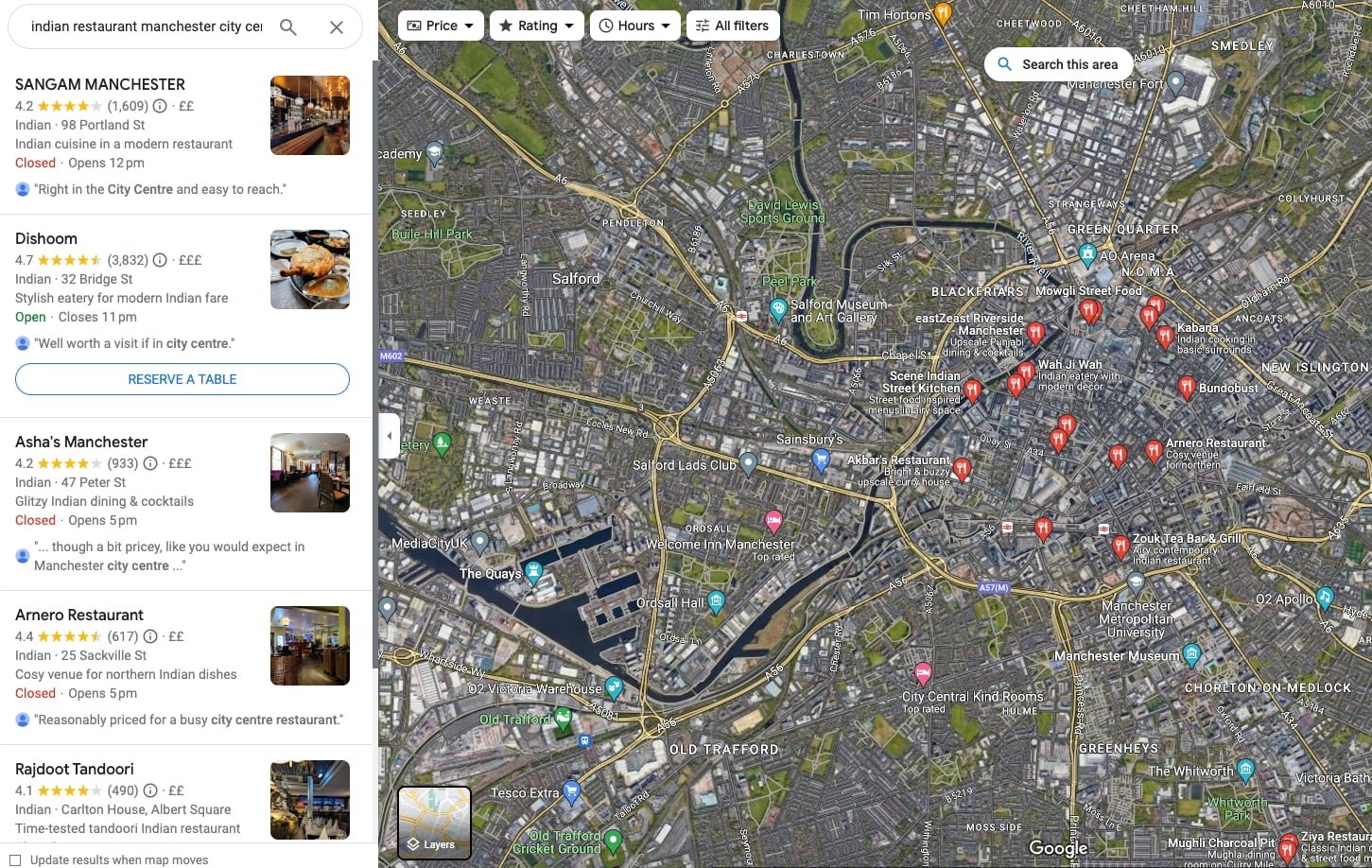
Once again, ensuring your website for location-based keywords and pages is the most important place to start. If your business appears at the top of Google for these search results, you are already on your way to beating your competition.
Also, you need to ensure that your business is registered on Google Business Profile. We have provided a guide further down this blog on how to claim your business listing if you are unsure.
By taking this step, you’ll not only establish your business presence on Google Maps but also empower customers with the ability to leave reviews, enhancing the credibility of your food and services.
5) Dental Practices
When you have throbbing tooth pain that will not go away, what’s the first thing you do? After rubbing whiskey on your gums, you would search for ‘dental practice near me’ in a search engine.
As previously mentioned, optimise your Google Business Profile page to ensure your dental practice appears in Google Maps, and make sure your website’s content optimises long-tail geographical keywords such as ‘dental practice in Manchester’.
But what else can you do if you want your dental practice to appear above other competitors in your local area?
There are some other important elements to focus on for your website’s content, such as:
- Add your dental practice’s location and service area on your website.
- Ensure you are creating high-quality, authoritative content utilising relevant keywords.
- Make your website easy to navigate by including plenty of menubar categories, subcategories, and internal links using target keywords as anchor text.
- Build your website to be mobile-friendly, and make sure it loads fast.
- Optimise your website for voice search by using long-tail keywords, e.g. ‘teeth whitening in Manchester’.
Also make sure your dental practice appears in local directories, such as the business directory on your local newspaper’s website.
6) Golf courses & driving ranges
Now stay with us on this one.
While it may appear different from the other industries we’ve covered, local golf courses and driving ranges actually hold huge SEO potential – a largely untapped resource that many of them have yet to capitalise on fully.
For example, if you are running an SEO campaign for a golf driving range, there are a lot of potential opportunities to attract more visitors via Google’s organic search results.
If the driving range offers lessons to beginners, you could optimise your website’s content for ‘beginner golf lessons near me’. It provides an opportunity for your website to rank high for this keyword in Google’s Map Pack featured snippet, and if your driving range offers online bookings, you can increase your online traffic and sales for golfing lessons.
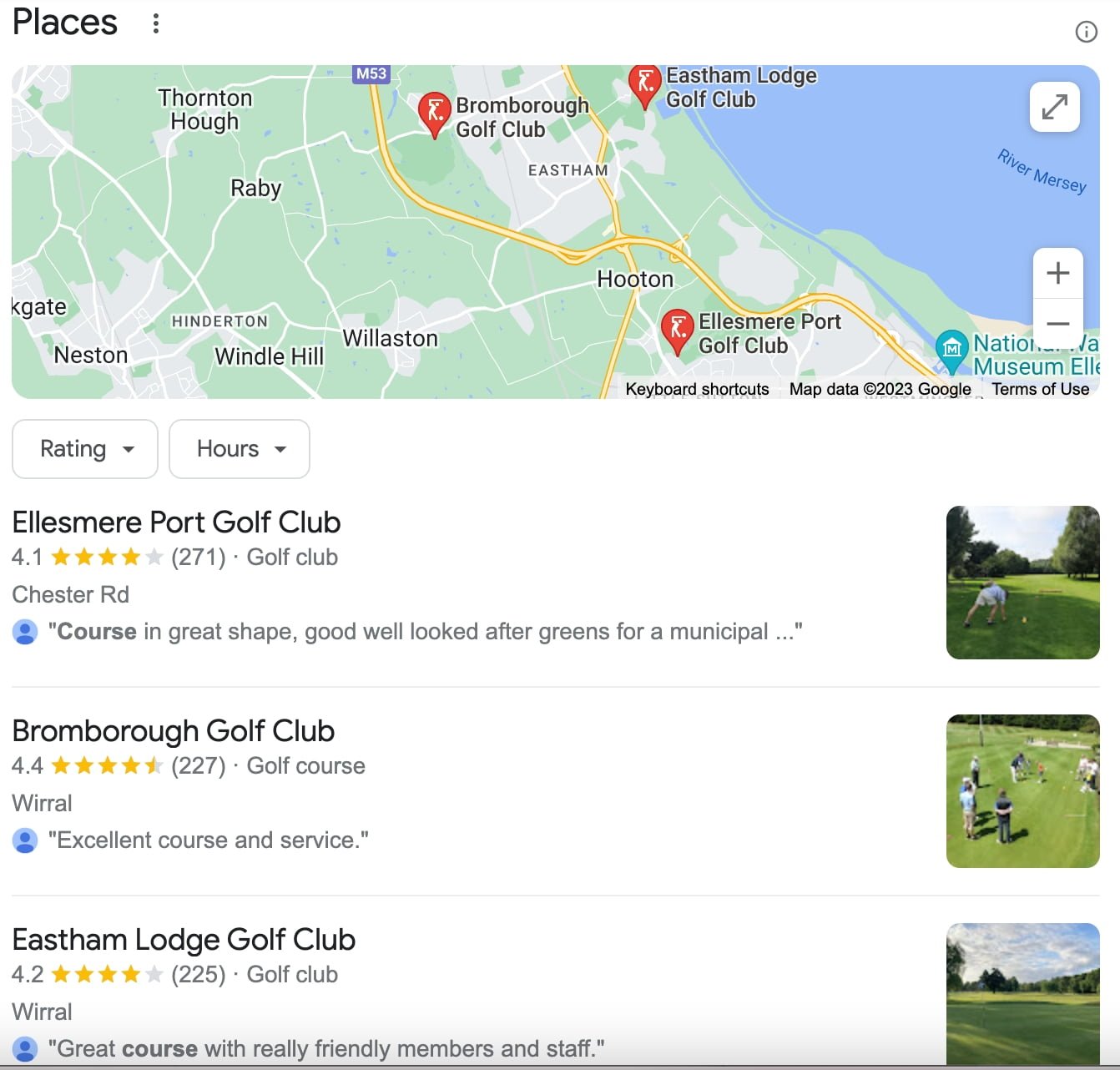
This may sound like a quick win – but it can take time for Google to rank keywords on page 1 of search results.
Keep posting regular content to build topical authority whilst increasing backlinks from relevant websites and directories. Remember to ensure your website offers a fast, user-friendly experience to allow users to find your golf course or driving range easily and make a quick booking to practice their swing.
7) Mechanics & automotive services
Has your car got a flat tyre? Do you need an MOT or service at a garage near your house? These are all issues that you may want to find a resolution for on Google.
And what better way to do that than to search for ‘tyre garage near me’, or ‘MOT service in Chester’. Searching for keywords that are related to your car issue and location will find you garages that are within your reach.
If you’re a mechanic, you are likely very busy and don’t have much time to focus on a full local SEO campaign for your website. That’s why it is best to ensure you add basic details on your website such as your garage’s address, phone number and an enquiry form that is easy to access on both desktop and mobile.
Also, make sure you are ranking for local keywords. For example, you may name one of the website’s main landing pages in your menubar ‘MOT Service Chester’ if you are Chester-based or nearby.
8) Beauty and hairdressing
When you need a haircut and makeover, and if you’re new to town or visiting somewhere – what’s the first thing you do?
If you have just moved to the beautiful, historical city of Bath, and need your hair cut and styling, you will likely pull your phone out and search for ‘hair salons in Bath’.
It is important to make sure your website is ranking for local keywords, but you should also consider what users first see on your website if they are looking for a new hairdresser to pay a visit.

Consider adding an offer for booking your first appointment online. If you have a discount code that users can apply when booking, this might be redeemed upon payment once you have your hair cut, washed and styled. It could attract more local customers to revisit your business in the future.
It will not only increase word of mouth for your business locally but can also increase conversions for local users landing on your website through local keyword searches on search engines.
If you own any of the above businesses and need some more tips to run an effective local SEO campaign, read on for more local SEO advice to help you fully optimise your businesses for local online traffic.
How to optimise a website for Local SEO
Fully optimise your Google Business Profile page
Realistically, this is where you should always start for any local SEO campaign. Google Business Profile (formerly known as Google My Business) is fully supported and verified by the Google search engine itself, meaning it is a crucial tool for getting your business noticed online.
It is plain and simple – you MUST claim your listing on Google Business Profile to improve your business’s online presence locally. The good news is it is super easy to do this if you haven’t done it already.
First, type business.google.com into your browser’s URL search bar.
![]()
Once you land on the page, enter the name of your business.
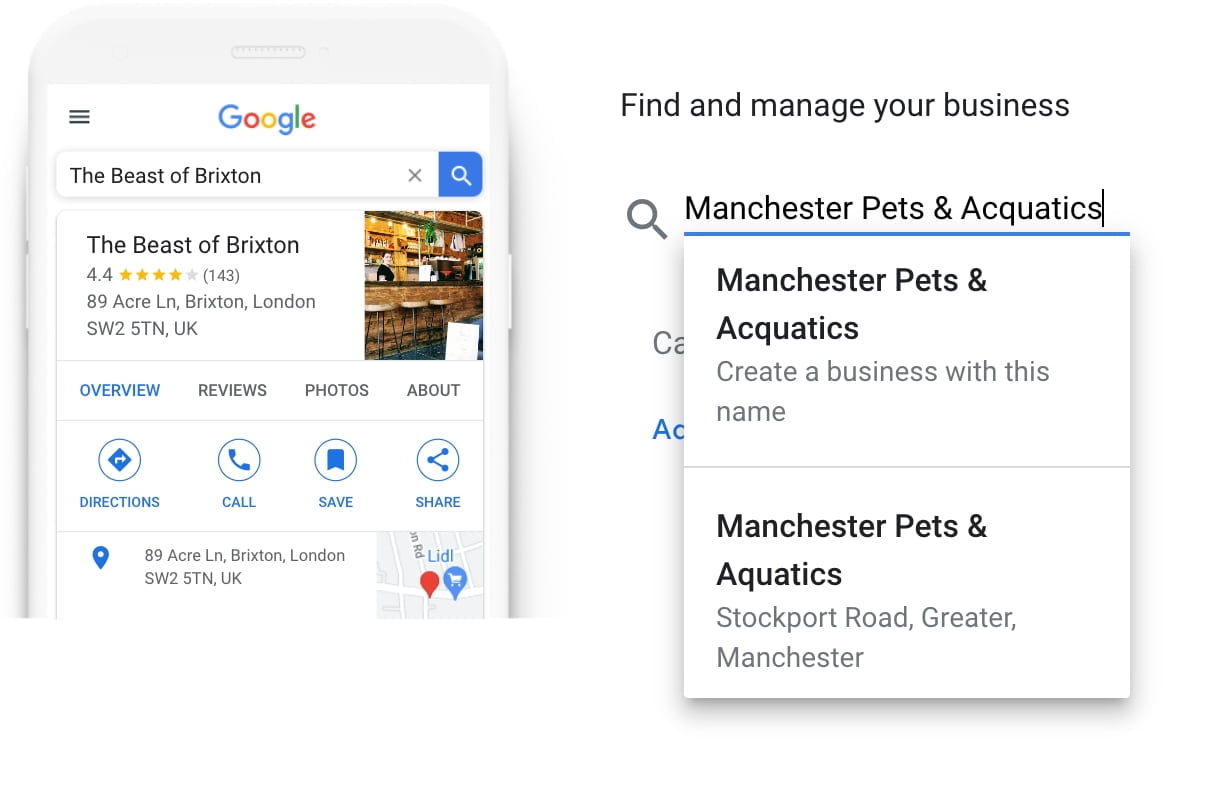
If your business exists, you will be met with a page featuring a ‘Request Access’ button. All you need to do is click this, then fill in the access request form.
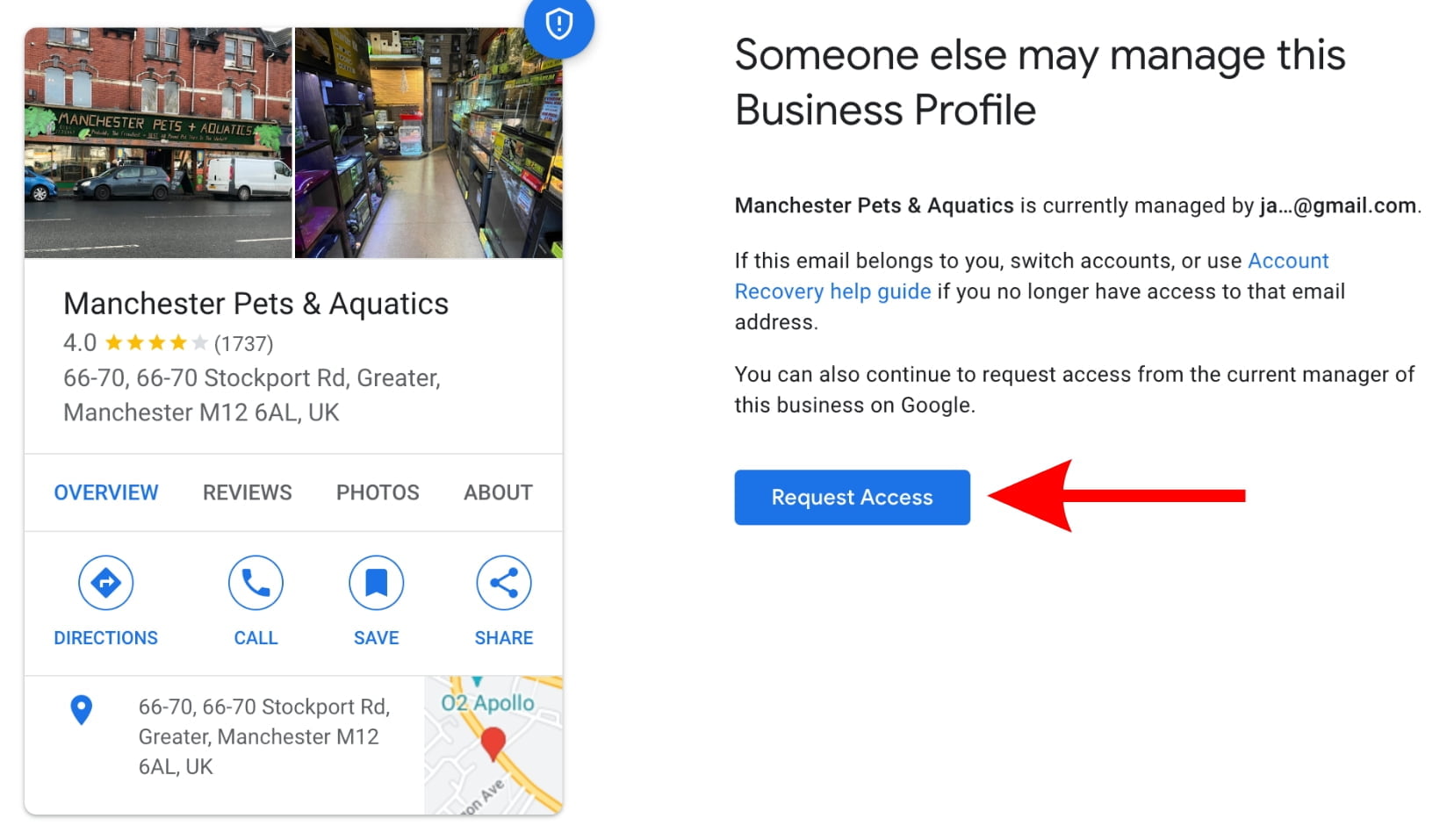
Once you have filled in the form, click ‘Submit’. The current profile owner will then receive an email requesting them to contact you about your request, and you will also receive a confirmation email.
If your business is NOT already registered on Google Business Profile, when you are on the ‘Find and manage your business’ page, you need to click ‘Add your business to Google’.
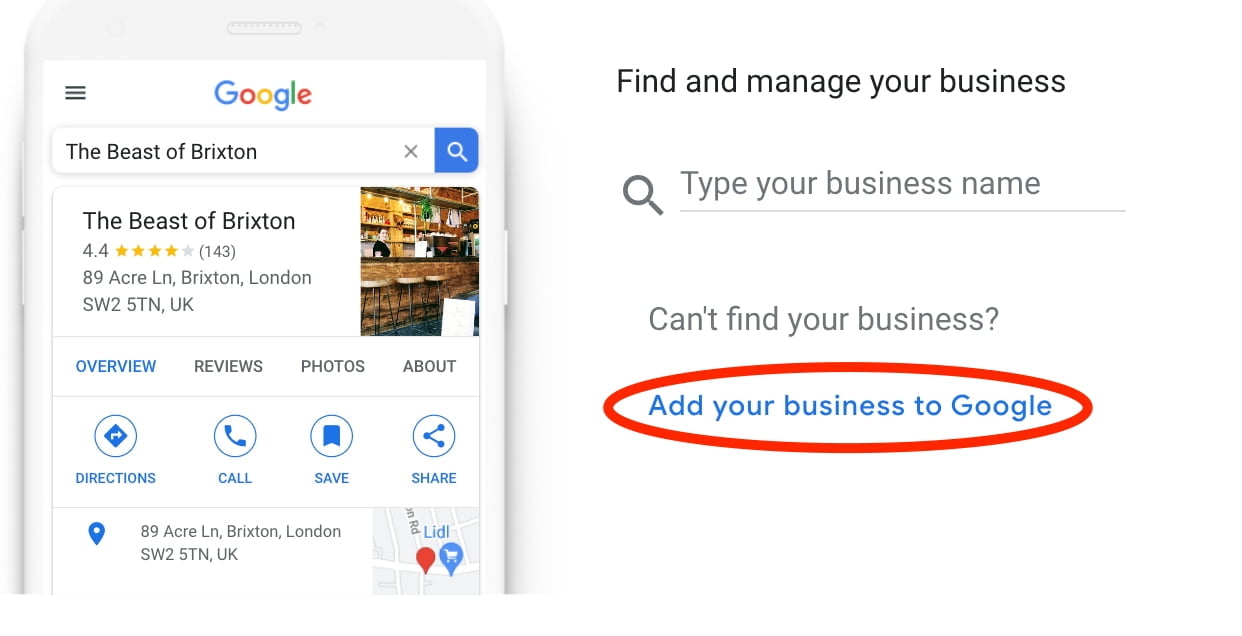
From here, you will need to fill in the step-by-step form where you fill in your business details such as the name, address, phone number and other important information. The phone number you entered will receive a 6-digit verification code that you need to enter to activate your listing.
Once you have claimed your listing, you need to fully optimise your Google Business Profile page. To do this, you need to:
- Create and verify your page.
- Add a phone number with a local area code.
- Add your opening hours and make sure they are correct.
- Write a coherent and compelling business description.
- Implement high-resolution photos that show off your business and services.
- Regularly respond to reviews (good and bad).
- Write and add relevant posts linking to your website’s blogs to engage users on Google.
If Google can see your business is authoritative, authentic and informative, you can increase your presence in Google’s search results and Google Maps alike.
Ensure your business’s NAP is consistent online
It needs to be easy for people and search engines to find your business, and one step towards this is setting up your NAP.
But what is NAP?
Simply put, NAP stands for ‘Name, Address, Phone number’ and is pivotal in helping search engines understand and accurately list your business in local search results.

Inconsistent NAP information can confuse search engines and potential customers, affecting your business’s online presence and reputation. So ensure you triple-check your business information across the web to save any issues.
Why does NAP consistency matter?
Search engines, especially Google, rely on accurate and consistent information to deliver relevant search results to users.
When there’s inconsistency in your business’s NAP information across various online platforms, directories, and websites, search engines can face difficulties in accurately discerning the essential details of your enterprise. It can result in your business being displayed incorrectly in local search results or, worse, not being displayed at all.
There are a few things you can do to ensure you maintain NAP consistency for your business:
- Create a master record that stores all NAP information for your business.
- Update your website with the correct NAP information.
- Add your NAP details for your online directory and local citation listings.
- Ensure your social media profiles contain the correct NAP details.
- Implement ‘PostalAddress’ schema markup on your website to help search engines understand NAP.
Consistency is key with SEO, and your NAP info is no exception. So make sure you do everything you can to ensure your contact info is consistent across the web.
Optimise for voice search with long-tail keywords
Out of all the constantly changing trends in the SEO world, one that has gained significant momentum in recent years is voice search.
As voice-activated virtual assistants like Siri, Google Assistant, and Alexa become more integrated into our daily lives, your website’s online presence for voice search can provide a competitive edge.
Long-tail keywords play a pivotal role in this optimisation strategy since they provide more specific phrases that people use when conducting searches online.
To make the most of this, you need to do your research. Optimise your website for long-tail keywords by:
- Understanding the user intent – Voice search queries are often more conversational and question-oriented. Anticipate questions potential customers might ask about your business and services.
- Focusing on the local context of your keyword research – Incorporate local identifiers in your long-tail keywords, such as city names, neighbourhoods, or landmarks. It helps connect your business to the local community. For example, try optimising your website for ‘Hair salon in Preston’ if you run a hairdressing business in Preston.
- Using natural language – Long-tail keywords should mirror how people naturally speak. Consider how someone would ask a question verbally and incorporate that phrasing into your content.
- Answering questions – Craft content that directly answers common questions related to your industry or business. You can research frequently asked questions in Google using tools like SEMRush or AlsoAsked. It increases the likelihood of your content featuring in voice search results.
- Adding voice search on your website – Implement schema markup to provide structured data that search engines can easily understand. It can improve your chances of being selected as the voice search result.
Build local citations
If you want your business to be recognised locally, one of the best ways of doing this is by adding your NAP and website URL to local directories.
Adding listings on directory sites such as Yell, Yelp, and Foursquare can make your business more visible online, and it could lead to an increase in enquiries and sales if your contact details and website link are there.

You can also look at adding your business information to local newspaper directories. For example, if you are based in Manchester, add your listing to the Manchester Evening News business directory to boost your local presence.
Other Local SEO methods you can implement
There are so many different angles to local SEO, but to make things easier, we have created a list of some other quick methods you can use to boost your business’s local presence:
- Add your business info to your local Chamber of Commerce – This is one of the easiest backlinks you will ever get. In most cases, you do have to pay to join your local Chamber of Commerce. Nevertheless, it is still a place to get your business noticed by other business owners that can bolster your customer base and supply network.
- Sponsor local charity events – Another backlinking method utilising local SEO. By registering your support for local charities and investing in their events, you can build a network for your business online and offline.
- Embed Google Maps on your website – This makes it easier for users to see exactly where your business location is when visiting your website. To do this, all you need to do is:
- Click on the burger bar in the top left to open the dropdown menu

- Click on ‘Share or embedded map’

- Copy and paste the embedded code on your website’s contact, directions or about us page
What are the next steps for starting Local SEO?
If you follow our tips in this blog, you will go a long way to increasing your local and online presence, which can increase your business’s reputation and revenue. It is particularly relevant if your business is within one of the above industries.
For more help with a local SEO campaign, get in touch with our SEO team at Fly High Media.
Consistency is key with SEO, and your NAP info is no exception. So make sure you do everything you can to ensure your contact info is consistent across the web.", "name": "Ensure your business's NAP is consistent online", "url": "https://www.flyhighmedia.co.uk/8-businesses-that-can-benefit-from-local-seo/" },{ "@type": "HowToStep", "text": "As voice-activated virtual assistants like Siri, Google Assistant, and Alexa become more integrated into our daily lives, your website's online presence for voice search can provide a competitive edge. Long-tail keywords play a pivotal role in this optimisation strategy since they provide more specific phrases that people use when conducting searches online. To make the most of this, you need to do your research. Optimise your website for long-tail keywords by:
", "name": "Optimise for voice search with long-tail keywords", "url": "https://www.flyhighmedia.co.uk/8-businesses-that-can-benefit-from-local-seo/" },{ "@type": "HowToStep", "text": "If you want your business to be recognised locally, one of the best ways of doing this is by adding your NAP and website URL to local directories. Adding listings on directory sites such as Yell, Yelp, and Foursquare can make your business more visible online, and it could lead to an increase in enquiries and sales if your contact details and website link are there. You can also look at adding your business information to local newspaper directories. For example, if you are based in Manchester, add your listing to the Manchester Evening News business directory to boost your local presence.", "name": "Build local citations", "url": "https://www.flyhighmedia.co.uk/8-businesses-that-can-benefit-from-local-seo/" },{ "@type": "HowToStep", "text": "There are so many different angles to local SEO, but to make things easier, we have created a list of some other quick methods you can use to boost your business's local presence:
Click on the burger bar in the top left to open the dropdown menu. Click on ‘Share or embedded map'. Copy and paste the embedded code on your website's contact, directions or about us page.", "name": "Other Local SEO methods you can implement", "url": "https://www.flyhighmedia.co.uk/8-businesses-that-can-benefit-from-local-seo/" }] }
Contact Us
Cheshire (Head Office)
Manchester
Get in touch
Let’s find the best solution for your business



